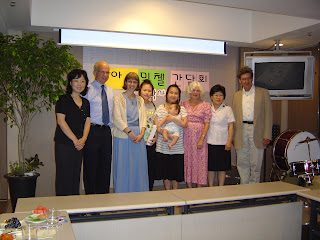Saturday we started the day viewing a film about sexual violence in S. Korea. It was a documentary full of the stories of women who had experienced sexual violence at different ages and stages of life, and in various degrees of severity. As seems to be true in so many parts of the world, women are often blamed, often blame themselves, and/or freeze and are unable to defend themselves in their terror. The women in this film, however, are all doing things that indicate they are not just victims but survivors, that they are able to thrive in their lives, stand strong with each other, and while certainly intensely affected, the sexual violence does not define them.
We were inspired to think that sometime soon, there will be documentaries like this about unwed moms. Moms will tell their stories, will show the country how strong they are, what good moms they are, how despite very difficult challenges, they are able to work for changes in the legal and social service systems to better their lives.
And then we went to a meeting of a group of women who are unwed moms who are just beginning to form their own organization. They are learning about what it means to have an organization and run it. They are learning about many aspects of the current situation for unwed moms in terms of government supports, educational opportunities, child care, employment, etc. In the long run, they plan to advocate for better conditions for themselves and their children, and all the women and children like them, who are discriminated against because they were not married when they had a child.
The meeting was full of energy, commitment, caring, intelligence and wisdom. The moms ranged from a woman who is 8 months pregnant to a mom of a nine year old. The meeting also included some single moms, experts, journalists and the mother of one of the moms. It was such a privilege to be included. We have no doubt that this groups will grow, and will be successful in working for their own needs, while supporting each other through difficulties.
The topic of the day was governmental income support and housing support they might be eligible for. It was clear very quickly that there are many rules and regulations that are confusing and maybe even contradictory. The officials who implement the programs have a wide range of discretion, so much depends on the attitude of the official in the local office where moms apply for benefits. As in the US, if you start to earn money, you can loose all your benefits, so it is hard to transition from government support to self support. We were surprised to hear that the income and assets of many relatives are taken in consideration, not just the unwed mom's parents, in making a determination. Even if the woman is not supported in any way by these relatives, she can be denied benefits because the government assumes these relatives could support her. It helped us understand one of the reasons why there is a gap between the government programs available and the actual experience of many unwed moms of being unable to qualify for them.
The housing supports available sounded equally confusing. There are several different kinds of support available. In order to qualify, you are rated not only on income and need, but also if you do volunteer work or other positive things in the community. Again, there seems to be a lot of room for the government official's own judgment of who is deserving of support.
The women shared information on how they had applied, what information was needed, when they had been able to receive support and when not. It was clearly a group committed to helping each other out.
Overall we thought the good news is that there are a number of important government income and housing programs available. The challenge is to make them accessible to moms who need them. Moms need to be free of the discrimination made possible by the high level of individual discretion available to officials, and to be able to qualify based on their own situations, not that of their families. So many unwed moms have difficult relationships with their families and may even be estranged. And the government will need to look at how to make the transition from receiving benefits to self support more gradual. Lastly it was clear that there is insufficient governmental funds to make these supports available to all who apply. AGain, the local officials seem to be the one to decide who gets the limited resources. If the Korean people decides to support these moms and their children, there will need to be an increase in allocations and clear directive to qualify moms with their children.
Another thing that struck us was the way women are let go from work or removed from school when their pregnancy is apparent. And that their personal registration document, which must be shown when applying for a job, includes their status as unwed moms. This level of legal discrimination is a huge obstacle for these women. It reminded us of how far we have come in the US in making this kind of discrimination against women illegal. While it undoubtedly continues, it has dramatically decreased, given the legal protections for women and their children in the US.
Listening to the moms, we have complete confidence that they themselves will be able to educate government officials and legislators on their needs, very soon. We left thinking that in just a couple of years, these powerful women will have changed their world for the better.
















